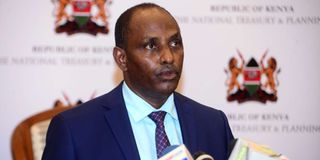Premium
Yatani: Brace yourselves for tough times

National Treasury Cabinet Secretary Ukur Yatani speaks during the launch of a Comprehensive Insurance Cover for Civil Servants and National Youth Service employee at Nairobi Serena Hotel on November 18, 2020.
What you need to know:
- Mr Yatani said Kenya’s public debt stands at Sh7.2 trillion, about 71.2 per cent of the GDP.
- IMF, the World Bank and the civil society have raised concerns about the continued piling of public debt.
National Treasury Cabinet Secretary Ukur Yatani has warned of tough times ahead that could lead to delayed disbursement of money for State operations as Kenya’s debt level hits Sh7.1 trillion.
Appearing before the National Assembly Finance and Planning Committee, the minister said the Covid-19 pandemic wiped out sources of revenue, leaving the government with no option but to borrow more from local and external markets.
“Supporting the budget and preventing the economy from crashing is our main priority. We borrow to support the budget because revenue is either limited or not there,” Mr Yatani said on Wednesday, despite protests from lawmakers that Kenya has neglected small and medium enterprises “and is on a pathetic borrowing spree”.
“I will be dishonest if I say everything is okay. We are in a state never witnessed before. The drastic reduction in revenue and underperformance of the economy is a concern.”
The country plans to spend Sh3 trillion in the current financial year but Treasury will borrow more to bridge the Sh841 billion gaping hole.
Mr Yatani said Kenya’s public debt stands at Sh7.2 trillion, about 71.2 per cent of the GDP.
The composition of Kenya’s external debt is 39 per cent multilateral, 30 per cent bilateral and 31 per cent commercial.
The debt, which is about Sh1.9 trillion shy of the borrowing ceiling as provided for in the Public Finance Management (PFM) Act, is inclusive of the Sh1.87 trillion Kenya borrowed between February 1, 2017 and August 31, 2020, according to documents submitted to the House.
Before the PFM (National Government) Regulations were amended last year, the country’s debt ceiling was 50 per cent of the GDP.
The committee is chaired by Homa Bay Woman Representative Gladys Wanga.
“I am not convinced the figures you are giving are telling everything. This is a rosy picture you are painting about the country’s debt management,” Kisumu Town East MP Shakeel Shabbir said.
He added that the absence of an autonomous management unit in Kenya could be the reason the government has accrued such an astronomical debt.
Piling public debt
The International Monetary Fund (IMF), the World Bank and the civil society have raised concerns about the continued piling of public debt.
They say the situation may see the government fail to honour its repayment obligations.
Of the public debt stock, some Sh3.66 trillion is external (51 percent) with the remaining Sh3.45 trillion – translating to 49 per cent – being domestic.
Internal debts attract an average yearly interest of 11 per cent, compared to the 4.2 per cent for external loans.
China is Kenya’s leading bilateral lender at Sh750 billion. The loans attract an annual interest of about three per cent.
The public debt includes about Sh169 billion in guaranteed loans extended by the government to loss-making Kenya Airways, Kenya Power, KenGen and Kenya Ports Authority.
Despite concerns from MPs, Mr Yatani said Kenya has never defaulted on her repayment and that debt indicators would improve as the country opens up.
“Our debt strategy is sustainable. Kenya has never been given relief on account of being unable to repay her loans,” Mr Yatani said.
But even as the furore over the piling of debt continues, Treasury has acquired a $1 billion loan from the Bretton Woods institutions to support the budget.
About $780 million is from the IMF and the rest from the World Bank.
The MPs said they are concerned the IMF loan, which the CS praised as “highly” concessional as it comes with a zero interest and a 10-year repayment period, has strings attached.
The World Bank loan has a Sh1.4 per cent interest rate. It should be repaid in 30 years.
The IMF wants Treasury to abolish income tax relief, reduce public service workers and freeze employment.





